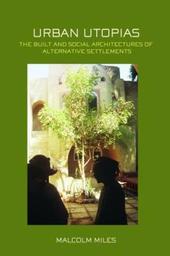
|
Urban Utopias: The Built and Social Architectures of Alternative Settlements
Paperback
Main Details
| Title |
Urban Utopias: The Built and Social Architectures of Alternative Settlements
|
| Authors and Contributors |
By (author) Malcolm Miles
|
| Physical Properties |
| Format:Paperback | | Pages:272 | | Dimensions(mm): Height 234,Width 156 |
|
| ISBN/Barcode |
9780415375764
|
| Classifications | Dewey:307.77 |
|---|
| Audience | | Undergraduate | | Postgraduate, Research & Scholarly | | Professional & Vocational | |
|---|
| Illustrations |
33 black & white illustrations, 33 black & white halftones
|
|
Publishing Details |
| Publisher |
Taylor & Francis Ltd
|
| Imprint |
Routledge
|
| Publication Date |
22 February 2005 |
| Publication Country |
United Kingdom
|
Description
Utopia tends to generate a bad press - regarded as impracticable, perhaps nostalgic, or contradictory when visions of a perfect world cannot accommodate the change that is necessary to a free and self-organizing society. But people from diverse backgrounds are currently building a new society within the old, balancing literal and metaphorical utopianism, and demonstrating plural possibilities for alternative futures and types of settlement. Thousands of such places exist around the world, including intentional communities, eco-villages, permaculture plots, religious and secular retreats, co-housing projects, self-build schemes, projects for low-impact housing, and activist squats in urban and rural sites. This experience suggests, however, that when planning and design are not integral to alternative social formations, the modern dream to engineer a new society cannot be realized. The book is structured in four parts. In part one, literary and theoretical utopias from the early modern period to the nineteenth-century are reconsidered. Part two investigates twentieth-century urban utopianism and contemporary alternative settlements focusing on social and environmental issues, activism and eco-village living. Part three looks to wider horizons in recent practices in the non-affluent world, and Part four reviews a range of cases from the author's visits to specific sites. This is followed by a short conclusion in which a discussion of key issues is resumed. This book brings together insights from literary, theoretical and practical utopias, drawing out the characteristics of groups and places that are part of a new society. It links today's utopian experiments to historical and literary utopias, and to theoretical problems in utopian thought.
Author Biography
Malcolm Miles is Professor of Cultural Theory at the University of Plymouth, UK, where he convenes the Critical Spaces Research Group and coordinates a research methods programme for the Faculty of Arts.
|